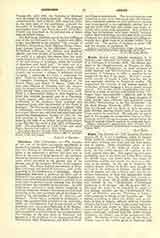

Aberle, MORITZ VON, Catholic theologian, b. at Rottum, near Biberach, in Swabia, April 25, 1819; d. at Tubingen, November 3, 1875. He became professor in the Obergymnasium, at Ehingen, in 1845; director of the Wilhelmstift, in 1848; professor of moral theology and New-Testament exegesis in the university at Tubingen, in 1850, a position he retained till the day of his death. He had a considerable number of pupils in both branches, but he was especially devoted to Scriptural studies. He emphasized the activity of the human bearers of revelation, without changing it into a purely natural process. The results of his investigations he published in a series of articles contributed to the “Tubingen theol. Quartalschrift”, 1851-72, and to the “Bonner theol. Lit.-Blatt”. The main thoughts of these articles were collected and published under the title, “Introduction to the New Testament“, by Dr. Paul Schanz (Freiburg, 1877). Aberle’s view that the Gospels and the Book of Acts are apologetic writings, meeting certain needs of the Apostolic times, cannot be sustained. He took also an active part in the struggle for ecclesiastical liberty in Wurtemberg, and his strong newspaper articles forced the State to arrange Church matters on a tolerable basis.
A.J. MAAS

